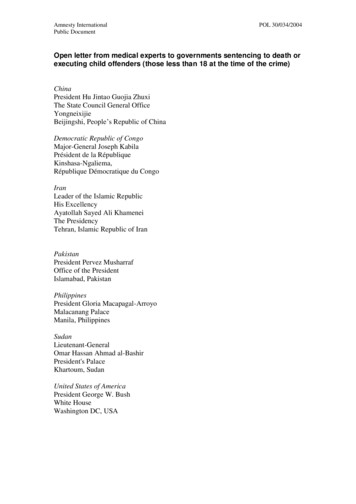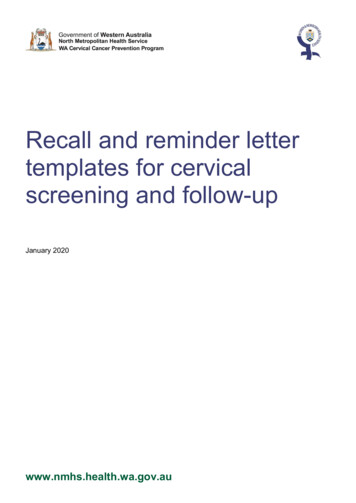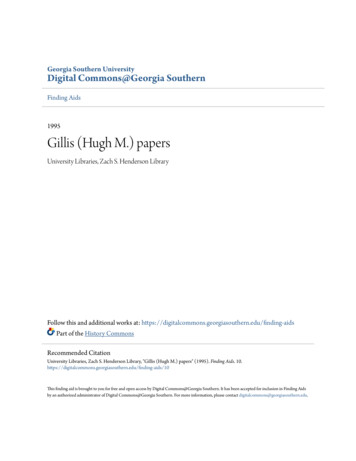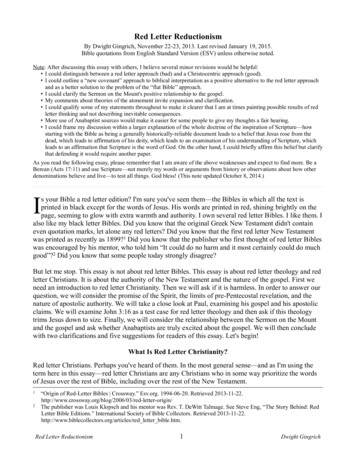
Transcription
Amnesty InternationalPublic DocumentPOL 30/034/2004Open letter from medical experts to governments sentencing to death orexecuting child offenders (those less than 18 at the time of the crime)ChinaPresident Hu Jintao Guojia ZhuxiThe State Council General OfficeYongneixijieBeijingshi, People’s Republic of ChinaDemocratic Republic of CongoMajor-General Joseph KabilaPrésident de la RépubliqueKinshasa-Ngaliema,République Démocratique du CongoIranLeader of the Islamic RepublicHis ExcellencyAyatollah Sayed Ali KhameneiThe PresidencyTehran, Islamic Republic of IranPakistanPresident Pervez MusharrafOffice of the PresidentIslamabad, PakistanPhilippinesPresident Gloria Macapagal-ArroyoMalacanang PalaceManila, PhilippinesSudanLieutenant-GeneralOmar Hassan Ahmad al-BashirPresident's PalaceKhartoum, SudanUnited States of AmericaPresident George W. BushWhite HouseWashington DC, USA
3 September 2004Dear President, Dear Prime Minister, Dear Leader,We are writing to you on the subject of the death penalty in our capacity as specialistsworking in adolescent mental and physical health and development. We are particularlyconcerned by the practice of sentencing to death and executing people whose crimes werecommitted when they were below the age of 18 (“child offenders”).We believe that your country is one of the handful which have sentenced to death orexecuted one or more child offenders in the last decade1. We are deeply concerned by this fact.The restriction on the application of adult penalties to juveniles is a widely acceptedprinciple in law around the world. The reason for this was set out, for example, in an opinion ofthe US Supreme Court in the capital appeal case of Johnson v Texas in 1993, an appeal based,among other things, on the failure of a Texas court to adequately take into account Johnson'sage at the time of the crime.The court observed that: "A lack of maturity and an underdeveloped sense ofresponsibility are found in youth more often than in adults and are more understandable amongthe young. These qualities often result in impetuous and ill considered actions and decisions." 2Our work with adolescents makes clear to us that this period of life is marked by thekind of "underdeveloped sense of responsibility" cited by the US Supreme Court.We would argue that although adolescents generally know the difference between rightand wrong, they can suffer from diminished capacities to reason logically, to control theirimpulses, to think through the future consequences of their actions, and to resist the negativeinfluences and persuasion of others. They should face punishment for criminal actions, but thesanctions which can be imposed on mentally competent adolescent offenders should not be thesame as those faced by adults found guilty of the same offences.3For these reasons, we believe that executing offenders aged less than 18 at the time oftheir offence is unacceptable.1Amnesty International. Stop Child Executions! AI Index: ACT 50/000/3004, January 2004.Johnson v. Texas (92-5653), 509 U.S. 350 (1993): .html.Johnson’s age at the time of the crime was 19 and even this age caused the judges concern.3See, for example, Steinberg L, Scott ES. Less guilty by reason of adolescence: developmental immaturity,diminished responsibility, and the juvenile death penalty. American Psychologist 2003 (December): 58:1009-18.2INTERNATIONAL SECRETARIAT1 Easton Street, London WC1X 0DW, United KingdomTel: Int. Code: 44 (20) 7413 5500. UK Code: 020 7413 5500. Fax: Int. Code: 44 (20) 7956 1157. UK Code: 020 7056 1157E-Mail: amnestyis@amnesty.orgWeb: http://www.amnesty.org
As you no doubt know, evolving international standards prohibit the execution of childoffenders. These standards include the International Covenant on Civil and Political Rights, theConvention on the Rights of the Child, the American Convention on Human Rights and theAfrican Charter on the Rights and Welfare of the Child. We attach the text of the relevantprovisions for your information. This prohibition is now so widely accepted as to constitute aprinciple of customary international law. The relevant standards are respected by theoverwhelming majority of the 80 countries which still retain and use the death penalty.We are aware that although almost all countries whose laws still provide for the deathpenalty have now established a minimum age of 18 in national law or have ratifiedinternational treaties binding them to respect the prohibition, some death sentences have stillbeen imposed and some executions have been carried out.We urge you to modify the current policy, practice or safeguards of your country sothat no one who was under the age of 18 at the time of the crime for which they have beenconvicted is sentenced to death or executed.In view of the interest attaching to this subject we will be making this letter available tothe public.Respectfully,[List of signatories follows]Signatories of open letter against executions of juvenile offenders4Robert Wm. Blum MD MPH PhDWilliam H. Gates Sr. Professor and ChairDepartment of Population and Family Health SciencesJohns Hopkins UniversityBloomberg School of Public HealthBaltimore, MarylandUnited States of AmericaDr Jens Buchhave [*]Chairman of the Child and Adolescent Psychiatric Association in DenmarkSpecialist in Child- and Adolescent PsychiatryChief Consultant at the Child and Adolescent Psychiatric Hospital,University Hospital of AarhusAarhusDenmarkProf. Jørgen CohnSpecialist in PaediatricsEmeritus Professor at the Paediatric-Health and Human Rights Department,University Hospital of Tromsø, Norway4All those listed in this letter are signing in their personal capacity except where indicated by an asterisk [*]indicating that the individual is signing on behalf of their organization; otherwise affiliations are given foridentification purposes only.
ÆrøskøbingDenmarkBoel Andersson Gäre MD PhD [*]Chairman of the Swedish Pediatric SocietyHead, Child Public Health, Jönköping County55185 JönköpingSwedenDr Robert HillardProfessor of Pediatrics, University of TorontoDirector of Education, Pediatric Medicine, Hospital for Sick Children555 University AvenueToronto, Ontario M5G 1X8CanadaDr Arne Høst [*]Chairman of the Danish Paediatric SocietySpecialist in PaediatricsChief Consultant at the Paediatric Department H,University Hospital of OdenseOdenseDenmarkDr Patrice HuerrePsychiatre Expert près la Cour d’Appel de ParisClinique Médico Universitaire Heuyer6 rue du Conventionnel Chiappe75013 ParisFranceDr Jørgen Hurum [*]Chairman of the Norwegian Paediatric AssociationSpecialist in PaediatricsConsultant at the Hospital of LillehammerLillehammerNorwayProfesseur Axel KahnDirecteur de l’Institut CochinDirecteur de l’IFR Alfred Jost22 rue Méchain75014 ParisFranceDr Björn Lundin [*]Chairman of the Swedish Society for Child- and Adolescent PsychiatrySpecialist in Child- and Adolescent PsychiatryConsultant at the University Hospital in Linköping
SwedenDr Klaus MindeProfessor of Psychiatry and Pediatrics, McGill UniversityDirector Anxiety Clinic, Montreal Children's HospitalMcGill University Health Centre2300 Tupper StreetMontreal, Quebec H3H 1P3CanadaCharles A. Nelson PhDDistinguished McKnight UniversityProfessor of Child Psychology, Neuroscience, and PediatricsNancy M. and John E. Lindahl Professor for Excellence in Teaching and Learning,Institute of Child DevelopmentUniversity of Minnesota51 East River RoadMinneapolis, MN 55455United States of AmericaJulius B Richmond MDSurgeon General of the United States of America, 1977-1981John D. MacArthur Professor of Health Policy Emeritus, Department ofSocial Medicine, Harvard Medical SchoolRecipient, C. Anderson Aldrich Award in Child Development, American Academy ofPediatricsCambridge, MAUnited States of AmericaAllan Rosenfield MDDean, Mailman School of Public HealthColumbia University722 West 168th Street, Suite 1408New York, NY 10032USAAssociate Professor Susan M Sawyer MBBS MD FRACPDirector, Centre for Adolescent HealthRoyal Children's HospitalParkville, Vic 3052AustraliaDr Jan Skandsen [*]Chairman of the Norwegian Association in Child- and Adolescent PsychiatrySpecialist in Child- and Adolescent PsychiatryConsultant at the Psychiatry Clinic, Child - and adolescent psychiatry dep.
StavangerNorwayLaurence Steinberg PhDDistinguished University ProfessorLaura H. Carnell Professor of PsychologyDepartment of PsychologyTemple UniversityPhiladelphia, PA 19122United States of AmericaDr Serge TisseronPsychiatrist and PsychoanalystProfessor, University Paris 7 Denis Diderot,75251 Paris Cedex 05FranceProfessor Eric Taylor FRCP FRCPsych FMedSciHead of Department of Child and Adolescent PsychiatryInstitute of Psychiatry - Kings College LondonDe Crespigny ParkLondon SE5 8AFUnited KingdomProfessor William YuleProfessor of Applied Child PsychologyInstitute of Psychiatry - King's College LondonDe Crespigny Park,London SE5 8AFUnited Kingdom
Legal aspects of juvenile offenders and the death penaltyFor a general overview of international law and the execution of juvenile offenders see:Amnesty International. The exclusion of child offenders from the death penalty under generalinternational law. AI Index: ACT 50/004/2003, 18 July 2003. (Available 42003)Specific standards include:International human rights treaties and standardso Article 6(5) of the International Covenant on Civil and Political Rights (ICCPR) statesthat "sentence of death shall not be imposed for crimes committed by persons beloweighteen years of age."o Article 37(a) of the Convention on the Rights of the Child (CRC) states that "neithercapital punishment nor life imprisonment without possibility of release shall beimposed for offences committed by persons below eighteen years of age".o Safeguard 3 of the UN Safeguards Guaranteeing Protection of the Rights of ThoseFacing the Death Penalty states that "Persons below 18 years of age at the time of thecommission of the crime shall not be sentenced to death". (UN Economic and SocialCouncil resolution 1984/50, adopted 25 May 1984 and endorsed by the UN GeneralAssembly in resolution 39/118, adopted without a vote on 14 December 1984)International humanitarian law treatieso Article 68 of the Fourth Geneva Convention of 12 August 1949 Relative to theProtection of Civilian Persons in Time of War states that ".the death penalty may notbe pronounced on a protected person who was under eighteen years of age at the timeof the offence."o The Protocol Additional to the Geneva Conventions of 12 August 1949, and relating tothe Protection of Victims of International Armed Conflicts (Additional Protocol I of1977) states in Article 77(5): "The death penalty for an offence related to the armedconflict shall not be executed on persons who had not attained the age of eighteen yearsat the time the offence was committed."o The Protocol Additional to the Geneva Conventions of 12 August 1949, and relating tothe Protection of Victims of Non-International Armed Conflicts (Additional Protocol IIof 1977) states in Article 6(4): "The death penalty shall not be pronounced on personswho were under the age of eighteen years at the time of the offence. . ." (Article 6(4))
Regional treatieso American Convention on Human Rights. Article 4(5) states “Capital punishment shallnot be imposed upon persons who, at the time the crime was committed, were under 18years of age or over 70 years of age; nor shall it be applied to pregnant women.”(O.A.S. Treaty Series No. 36, 1144 U.N.T.S. 123 entered into force July 18, 1978)o The African Charter on the Rights and Welfare of the Child states in Article 5(3): "Thedeath sentence shall not be pronounced for crimes committed by children". Article 2 ofthis treaty specifies that the term "child" refers to anyone under the age of 18.
Temple University Philadelphia, PA 19122 United States of America Dr Serge Tisseron Psychiatrist and Psychoanalyst Professor, University Paris 7 Denis Diderot, 75251 Paris Cedex 05 France Professor Eric Taylor FRCP FRCPsych FMedSci Head of Department of Child and Adolescent Psychiatry Institute of Psychiatry - Kings College London











